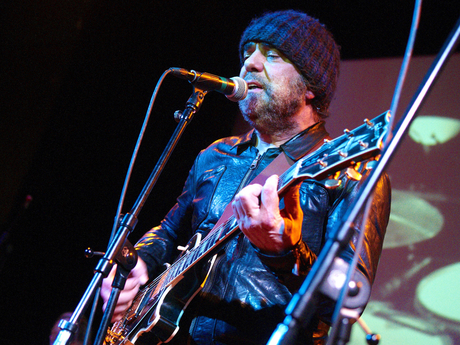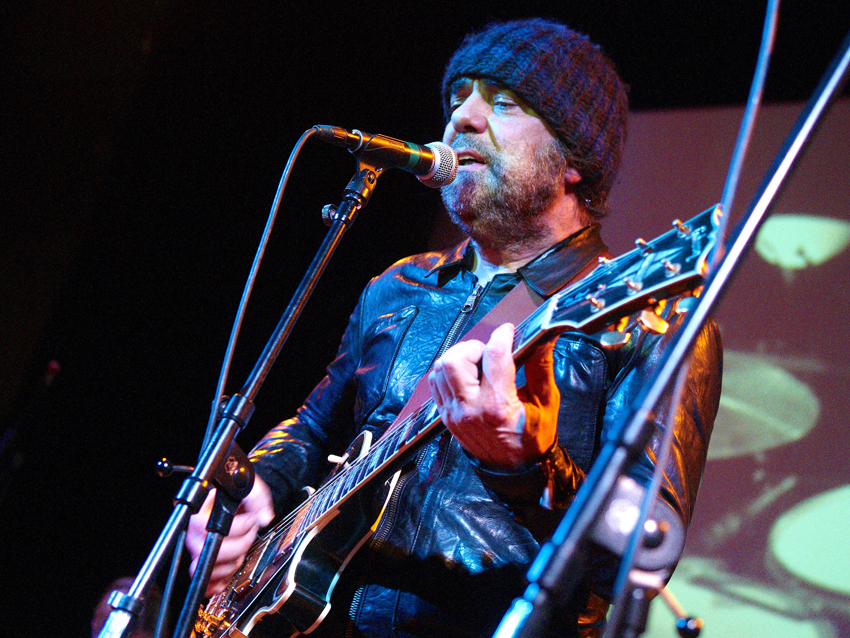

Acclaimed producer, engineer and artist in his own right, Daniel Lanois has helmed two of Bob Dylan's modern-day classics. © Tony Nelson ./Retna Ltd./Corbis
By the late '80s, Daniel Lanois was already an award-winning producer and engineer, renowned for his work with U2, Peter Gabriel, Brian Eno and Robbie Robertson, among others. But when Bob Dylan paid him a visit at his New Orleans studio, the iconoclastic sonic craftsman says, "I'd finally met my match."
Lanois produced what many call Dylan's 'comeback' album, 1989's Oh Mercy. The record, understated and intimate, hit number 30 in the US and cracked the Top 10 in the UK - the best chart showing of a Bob Dylan disc in years. In 1997, the two would team up again and reach greater heights with the rich and atmospheric Time Out Of Mind, an unqualified triumph that would nab three Grammy Awards, including Album Of The Year.
As MusicRadar celebrates Bob Dylan's 70th birthday, we caught up with Daniel Lanois and asked him to reflect on his work with the music legend.
When Bob Dylan first approached you to work with him, what were your initial thoughts?
"When the invitation, or should I say the suggestion, came to work with Bob Dylan, I felt a tremendous sense of responsibility to him. I put a lot of thought into what the record-making process should be like. First and foremost, I wanted to see to it that I could build a classic for Bob and to serve a national treasure well. I thought that the album should be one that he could expand on and then move forward to the next one. That's the responsibility I felt.
"I'm not a career builder, I'm a record maker. I didn't have visions of accolades or Grammy Awards or any of those things. I simply view myself as somebody who wants to do good work. With Bob, I wanted to make sure that his voice was captured powerfully, rendered with sincerity, and be viewed as great as it ever was. I knew that I wanted the center to be big. That was the challenge in the back of my mind.
Get the MusicRadar Newsletter
Want all the hottest music and gear news, reviews, deals, features and more, direct to your inbox? Sign up here.
"He's a hard worker. There's not a lot of dilly-dallying in the world of Bob Dylan. He gets down to it. All he needs is a copying machine, a chair, a guitar and a piano. He understands that if it doesn't come from him, then it's not going to come from the people around him. I knew that I was only there to enhance what he did. I acted as a bodyguard to his music.
"The thing you have to ask yourself is, 'What does a guy like Bob Dylan need?' Here's a man who has everything, who's done everything. Well, he needs a friend and a curator, a guy who will say, 'Bob, this one is better than that one. This one is really great - let's do it.' A friend is what he really wants from somebody who works with him. I was so happy to be that friend to him on two counts."
How did he present songs to you? I can't imagine him making demos.
"With the first album, Oh Mercy, I went to Bob's house, and he played me some songs on the piano. He didn't play them all the way through. He played maybe four or five lines and he'd say, 'What do you think? We got a song?'
"He sang some lines at me: 'Most of the time I'm clear focused all around/ most of the time I can keep both feet on the ground/ I can handle whatever I stumble upon/ I don't even notice she's gone/ most of the time…' When I heard those lyrics, I knew this was a very great and unusual angle at a love song. Not gushing, just appreciating. Recognizing somebody who's in your life some of the day, but that would be the best part of the day.
"Time Out Of Mind was different. Bob had all the lyrics on paper, and he read them to me. No music. Even so, when I heard the lyrics, I said, 'I think we've got a record.'"
Sonically, what does Bob look for? Did he ever tell you specifically the music he wanted to surround his lyrics?
"Bob is very neutral about his expectations. He doesn't really design the record he has in his mind. I think he wants to see what I might to say. Before we did Oh Mercy, he visited me in New Orleans when I was making a record with the Neville Brothers. I was very committed to the Nevilles; I had the studio custom built for them. Bob was on tour at the time, and he came by the studio when he was playing a show in town. We cut a version of With God On Our Side with Aaron Neville singing. Bob heard that and he said, 'That sounds like a record.' From Bob Dylan, that's a big compliment.
"At the end of the visit, we shook hands, and I said, 'Bob, do you want to come to New Orleans to make a record?' He said, 'OK, let's go.' I told him, 'When you come back here next spring, I'll have a new studio built for you. You don't need to bring anything except for you and your songs.'"
Recording-wise, how would you describe the differences between making Oh Mercy and Time Our Of Mind?
"Oh Mercy was two guys on a back porch, that kind of vibe. On Time Our Of Mind, we were in a big room with a big orchestra. Consequently, Time Our Of Mind has a more live feeling, more depth of field. We had 11 people in the room at times, so I think you can feel that intensity."
What is Bob Dylan like as a person?
"First and foremost, Bob Dylan is a great musicologist with an incredible knowledge of music, mostly American music. I find it incredibly interesting to hang out with him and ask him things like, 'What was that song about? What were you thinking when you wrong that? What was it like in the late '50s?'
"You know, at first, he wasn't writing songs. He would do other people's material, and he'd borrow little bits here and there. I think that's still the driving force behind him. He doesn't claim to be an innovator. That comes from other people."
As an artist in your own right, what did you take away from your experiences of working with Bob Dylan?
"That we operate from osmosis. We humans, if we feel inspired, we carry it into our work, and then we might inspire somebody else, as well. It's always been that way. You know, for a Canadian kid like me, who's essentially been a studio rat, an experimenter in a laboratory, to bump up against Mr Dylan, I felt like I'd finally met my match."
Joe is a freelance journalist who has, over the past few decades, interviewed hundreds of guitarists for Guitar World, Guitar Player, MusicRadar and Classic Rock. He is also a former editor of Guitar World, contributing writer for Guitar Aficionado and VP of A&R for Island Records. He’s an enthusiastic guitarist, but he’s nowhere near the likes of the people he interviews. Surprisingly, his skills are more suited to the drums. If you need a drummer for your Beatles tribute band, look him up.
“How daring to have a long intro before he’s even singing. It’s like psychedelic Mozart”: With The Rose Of Laura Nyro, Elton John and Brandi Carlile are paying tribute to both a 'forgotten' songwriter and the lost art of the long song intro
“The verse tricks you into thinking that it’s in a certain key and has this ‘simplistic’ musical language, but then it flips”: Charli XCX’s Brat collaborator Jon Shave on how they created Sympathy Is A Knife










